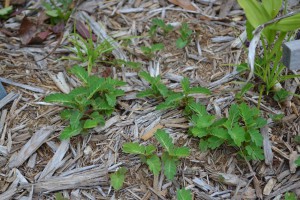Just when you think your battle against weeds is over for the summer, cooler nighttime temperatures and shorter days spark the beginning of a new crop of your least favorite plants. The question of many homeowners is: how did all the weeds get into my landscape?
There are many ways that weeds make it to the landscape. They can be brought in with new soil, mulch, container plants, dropped by birds, delivered on the fur of animals, carried by wind, or on the deck of a lawn mower. If that is not enough to depress you, then also realize that regardless of outside sources of weeds, your landscape already has plenty onsite that you don’t even know about.
In the soil, there is a large number of weed seeds ready to germinate when the conditions are just right. Understanding how your common landscape practices can encourage or discourage the germination of these seeds, can help you begin to manage some weed infestations.
Many of the seeds of common annual weeds are very small. They require exposure to sunlight in addition to the proper temperatures and moisture to germinate. Sunlight is critical, though, and seeds will not germinate without adequate sunlight. If the small seeds are deep in the soil, you will probably never know they are there. When you turn soil or disturb soil such as when installing plants, you bring the small seeds close to the surface and closer to light. They can then be stimulated to germinate. The next thing you know, you have an area covered in weed seedlings.
What does this mean for your gardening practices? Try your best to block sunlight from hitting exposed soil. You can do this by keeping a healthy turf, free of thinning spaces. A 2 to 3 inch layer of mulch in plant beds and vegetable gardens will reduce weed seed germination. Finally, when you are installing plants in an established bed, try not to mix soil with surrounding mulch. Seeds will easily germinate within the mulch if it becomes mixed with soil.
It is inevitable that your landscape will have some weeds but a few easy gardening practices can reduce some of your weed frustrations.
For more information:
Gardening Solutions: Weeds and Invasive Plants
Improving Weed Control in Landscape Planting Beds
- Gifts from the Garden - January 15, 2026
- A Plant From My Past - January 8, 2026
- Garden Spider Egg Sacs - October 23, 2025

